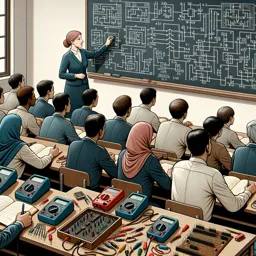Enroll in the free Basic Electronics Course for Beginners! With 45 pages of content and a free certification, master electronics, components, circuits, and more!
Course content
Introduction to electronics
2Electronic components
3resistors
4Capacitors
5inductors
6Diodes
7transistors
8operational amplifiers
9integrated circuits
10logic circuits
11power supplies
12Transformers
13rectifier circuits
14regulatory circuits
15oscillator circuits
16timer circuits
17power circuits
18audio circuits
19RF circuits
20circuit assembly
21Reading electrical schematics
22Circuit testing and measurement
23electronic security
24Maintenance of electronic equipment
25Digital electronics
26numbering systems
27logic gates
28flip flops
29Accountants
30registers
31analog-to-digital converters
32digital-to-analog converters
33Microcontrollers
34Microcontroller programming
35I/O interfaces
36serial communication
37parallel communication
38wireless communication
39Sensors
40actuators
41electronic projects
42Home automation
43robotics
44internet of things
45artificial intelligence in electronics
Course Description
The "Basic Electronics Course for Beginners" is an extensive journey into the core fundamentals of electronics designed to cater to aspiring electricians and enthusiasts. With a professional categorization and a significant focus on electrician-related topics, this course offers a structured path to understanding and mastering essential electronic concepts and components.
Starting with a comprehensive "Introduction to Electronics," the course lays the groundwork for learners by explaining the basic principles and theories that underpin electronic systems. This foundational knowledge is critical as students progress through the more detailed subjects.
The course systematically explores various "Electronic Components," including resistors, capacitors, and inductors. Through these explorations, students will learn not just about the components themselves but also about their functions and applications within circuits. Moving forward, learners delve into the specifics of diodes, transistors, and operational amplifiers, gaining vital insights into how these elements influence electronic behavior.
Integrated circuits and logic circuits are thoroughly covered, offering students the knowledge needed to understand complex systems. Additional emphasis is placed on power supplies, transformers, and various essential circuit types, such as rectifier circuits, regulatory circuits, oscillator circuits, and timer circuits. A deep dive into power circuits, audio circuits, and RF circuits ensures that students gain a holistic view of differing applications and their unique challenges.
To put theory into practice, the course includes modules on "Circuit Assembly" and "Reading Electrical Schematics." These sections are crucial for bridging the gap between conceptual understanding and real-world application. Following these, learners engage in "Circuit Testing and Measurement," which highlights the importance of precision and safety in electronics.
"Electronic Security" and "Maintenance of Electronic Equipment" are other critical components of the curriculum, ensuring that students are well-versed in safeguarding and troubleshooting electronic systems. The foray into "Digital Electronics" includes intensive study of numbering systems, logic gates, flip flops, counters, and registers, setting up a solid base for more advanced digital applications.
The course further expands on analog-to-digital and digital-to-analog converters, microcontrollers, and microcontroller programming. Critical communication methods such as I/O interfaces, serial, parallel, and wireless communications are also discussed, keeping modern connectivity needs in mind.
The practical side of the course incorporates learning about sensors, actuators, and a variety of electronic projects. These projects offer hands-on experience, emphasizing the importance of real-world applications. Emerging technologies are not left behind; the course explores home automation, robotics, and the burgeoning field of the Internet of Things (IoT). Additionally, there is a forward-looking segment on the role of artificial intelligence in electronics, encouraging students to think about the future of the field.
This free course includes:
1 hours and 38 minutes of audio content
Digital certificate of course completion (Free)
Exercises to train your knowledge
100% free, from content to certificate
Ready to get started?
In the app you will also find...
Over 5,000 free courses
Programming, English, Digital Marketing and much more! Learn whatever you want, for free.
Study plan with AI
Our app's Artificial Intelligence can create a study schedule for the course you choose.
From zero to professional success
Improve your resume with our free Certificate and then use our Artificial Intelligence to find your dream job.
You can also use the QR Code or the links below.






























